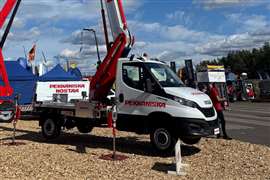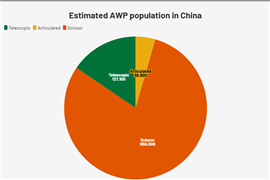Read this article in French German Italian Portuguese Spanish
Is the Italian equipment rental market in growth mode?
20 January 2025
Opportunities in Italy come in many forms, with infrastructure spending among the drivers offering potential for growth.
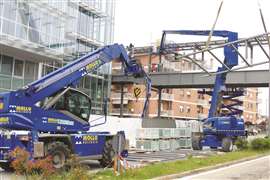 Mollo lifts carry out bridge erection. Photo: Mollo
Mollo lifts carry out bridge erection. Photo: Mollo
The Italian equipment rental market is one of the most diverse countries in Europe, with a well established customer base.
That said, it has faced similar challenges to those impacting neighboring countries, with its landscape shaped by economic conditions, regulatory frameworks, and market dynamics.
According to research from the European Rental Association (ERA), the equipment rental market in Italy was one of many countries in Europe that saw “steady growth” in 2024
That outlook was also backed up by Martin Seban, director of KPMG, in May last year, when he downgraded forecasts in several countries across the continent for 2024.
However, he noted that Spain and Italy maintained steady investment levels due to EU financial support, with projected growth of 5.5% and 3.5% respectively in 2025.
These forecasts build on an equally strong performance in 2023 in Italy, according to research by the Committee for European Construction Equipment (CECE), which shows that in 2023 construction investment grew by 5% overall, with positive growth across all sectors.
Public non-residential construction was even better at 18% growth.
However, housebuilding investment showed the most modest increase at 0.7%, compared to 2022.
The market in Italy is of course a complicated landscape. A new report from trade Italian association Unacea, in partnership with the economic research institute Centro Europa Ricerche (CER), forecasts a downward trend in certain segments of the construction sector, although it is expected to remain robust overall.
While 2023 saw a slight decline of 3.1% for construction machinery sales, compared to the previous year, said Unacea, it was still 47% higher compared to the volumes five years earlier.
Consolidation game
Like many countries with a longstanding, localised rental culture, there is growing consolidation in the rental market through acquisition. National rental company Mollo Noleggio has continued its expansion in the country with the acquisition of aerials renter Tecnostrutture in Fombio, Lombardy.
The purchase was the first Mollo made in 2024, having added a number of companies to its portfolio in 2023, bringing its total number of depots to 50.
The company followed that up at the end of the year with the acquisition of Sovecar Group’s rental division. Mollo said the deal for Trento-headquartered Sovecar, which also operates two branches in Isera (Rovereto) and Arco, marks “an important moment of growth” for the company.
As well as seeing Mollo enter the Trentino region for the first time, it also saw the company expand its coverage in Italy to 66 depots and over 600 employees.
Mauro Mollo, president of the Mollo Group, said the company “wants to continue to grow by acquiring realities specialised in rental, strongly rooted in the territory they belong to.”
However, while companies such as Mollo look to expand through acquisitions, there is also a growing number of smaller, very specialised rental companies concentrated in specific fields, such as telecommunication tower maintenance.
Paola Palazzani, president of Italy-based spider lift manufacturer Palazzani, confirms the situation; “There are two kinds of rental companies [in Italy] – one is the big generalists, where there’s a machine for everybody.
“The second type is the specialist service provider. They are rental companies, but they are very different from what we think about rental companies. They have specialised tools for their needs and maybe two big spiders.”
It is this latter sector that is seeing huge growth potential for companies like Palazzani.
Italy is not just a major producer of equipment for homegrown OEMs but is the chosen location for international companies too. Genie, for example, has committed to its presence in the country with its longstanding plant in Umbertide.
It supplies Europe and North America, among other regions, and has confirmed that it is set to increase its telehandler manufacturing capacities there.
Infrastructure fuels expansion
Infrastructure is also a significant long-term objective in the country. Italy’s own Webuild consortium has long been in the wings to build what will be the world’s longest suspension bridge, spanning the Stretto di Messina between Sicily and the Italian mainland.
The Eurolink consortium, led by Webuild, won a bid to build the bridge back in 2005. Italy’s new prime minister Giorgia Meloni said he now backs the project and it looks set to move forward in coming months.
Expansion in Italy is part of Mollo’s continued aim with new depots and acquisitions, which started in 2021 with Monia Noleggi in Forlì, followed by Parmiani Noleggi in Valtellina, PMP in Udine, Manetta Noleggi in Teramo, Edilservice in Siena and most recently, in March this year Tecnostrutture, which is based in Lodi.
Mollo’s fleet consists of over 13,000 aerial platforms, cranes and general rental equipment, including truck-mounted up to 75m working height, self-propelled and vertical platforms, spiders, fixed and rotating telehandlers, as well as cranes and other generalist construction rental equipment. On the aerials side the company also offers rental with an operator.
The company’s rental depots are located in nine regions and 36 Italian provinces, serving customers throughout Italy and abroad.
Mauro Mollo says the company will continue on the investment path. “This year we will continue to increase and renew our fleet of vehicles and as always we will select them among the most reliable and innovative manufacturers on the world market.”
In the two-year period from 2024-2025 the expects that investment in new machines will be €120 million.
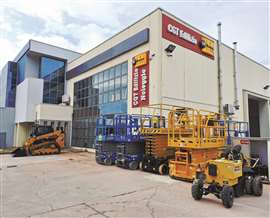 CGTE is expecting “a lot of opportunity” from the Winter Olympic Games in 2026. Photo: CGTE
CGTE is expecting “a lot of opportunity” from the Winter Olympic Games in 2026. Photo: CGTE
That will include the evolution of its Blue & Green transition program, which was formed in 2017 with the aim of growing reduced consumption and emission friendly equipment.
In the future purchasing choices will be increasingly towards vehicles with electric and hybrid technologies and Euro 6 and Stage V engines.
Of course, there are always challenges, as Mollo points out, “In Italy the increasing inflation and interest rates has caused a general increase in costs for companies.”
Brighter future
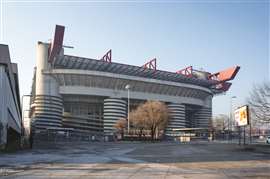 The San Siro in Milan will host the Winter Olympics opening ceremony. Photo: papava via AdobeStock
The San Siro in Milan will host the Winter Olympics opening ceremony. Photo: papava via AdobeStock
Italy, much like France earlier this year, will benefit when a global sporting event comes to town.
That opportunity for companies will come in the form of the Winter Olympics, which is set to be held in Milan and Cortina d’Ampezzo in 2026.
“The time is very short until 2026, so in terms of infrastructure and preparation of the Olympic Games, it will bring a lot of opportunity,” Vincent Albasini, CEO of CGTE tells IRN.
Another factor offering opportunities in Italy is the recent changes to tax incentives to develop the infrastructure and the renovation of private buildings that Italy introduced after the pandemic.
These conditions have sharpened the focus for Tesya, he says, and “motivated the market” in Italy.
“So, I see a very huge opportunity. The market is not concentrated, it’s very fragmented with a lot of different small and medium-sized companies.
“Now is the right moment to move fast, to move with a different approach. The consolidation is one. We have done some acquisitions in the last few months, and we are looking for the next one.”
Looking ahead, he says the industry will “need to look at what’s happened after the European Games and at the end of the tax incentive” to gauge opportunities.
The OEM view
The sentiment of growth amd opportunity is backed up by OEMs. Speaking to IRN, Alessandro Rossi, B.U. director Mobile Products, Pramac, said more rental depots are appearing around the country, and foreign brands such as Boels, Loxam and Kiloutou are also entering the market.
He says, “This is also being reflected in our company, as we are receiving more enquiries from various companies in the sector, which has led to an increase in production volumes of mobile equipment for the rental segment.”
In terms of investment, Rossi says many are still in the early phase of the green shift, which means diesel models are “the first choice of most customers.”
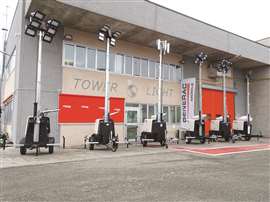 The GLT Series of lighting towers from Generac.
The GLT Series of lighting towers from Generac.
“Only rental companies specialising in event equipment are beginning to take a greater interest in more environmentally friendly models, in particular hybrid lighting towers and BESS,” he adds.
He also says that despite growth in the rental market, it has not yet reached its potential due to the current economic situation in Italy, which is forcing companies to refurbish units and make small investments.
Rossi reveals, “It is true that we’re receiving more orders than in the past, but they are small orders, especially if we compare them with much more developed markets, such as the UK.
“Hopefully, potential new infrastructure and the Winter Olympics will unlock new and larger investments.”
STAY CONNECTED



Receive the information you need when you need it through our world-leading magazines, newsletters and daily briefings.
CONNECT WITH THE TEAM











